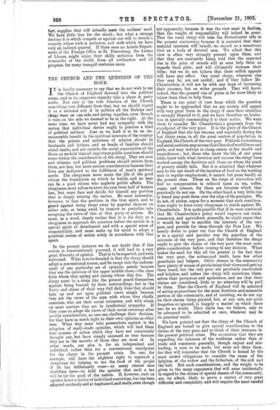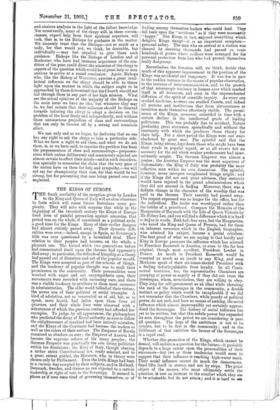THE CHURCH AND THE QUESTION OF THE HOUR.
IT is hardly necessary to say that we do not wish to see the Church of England descend into the political areaa„ and in its corporate capacity take a share in party strife. Not only is the true function of the Church something very different from that, but we should regard it as a national evil if in politics all the Bishops and clergy were on one side and acting together, even though it were on the side we deemed to be in the right. At the same time, we have never had any .sympathy with the notion that individual clerics ought to practise a kind of political celibacy. Just as we hold it to be an im- measurable benefit to the spiritual interests of the country that the priests and ministers of religion should be husbands and fathers, and as heads of families should stand inside, and not outside, the social organisation of the State, so we hold that all important public questions should come within the consideration of the clergy. They are men and citizens, and political problems should receive from them, not less, but more serious consideration because their lives are dedicated to the fulfilment of man's spiritual needs. The clergyman must make the life of the good citizen the foundation on which he builds, and no man can be a good citizen who neglects public affairs. The clergyman must refuse to avert his eyes from half of human ken, but must face and decide for himself any problem that is deeply stirring the nation. He must remember, however, to face the problem in the true spirit, and to guard against being swept away by popular clamour on either side, or being awed by rumour or prejudice into accepting the views of this or that party or section. He must, in a word, clearly realise that it is his duty as a clergyman to approach the question before the nation in a special spirit of detachment and with a special sense of responsibility, and must make up his mind to adopt a practical course of action solely in accordance with that spirit.
In the present instance we do not doubt that if this course is conscientiously pursued, it will lead to a very great diversity of opinion. That is to be expected, and even welcomed. What is to be dreaded is that the clergy should adopt a conventional course, and be swept into the endorse- ment of one particular set of opinions merely because they are the opinions of the upper middle class,—the class from' whom they spring and among whom they live. The clergy must in a crisis like the present guard themselves against being biassed by their surroundings, lest in the hurry and stress of their very full daily lives they should take _ up and act upon political views simply because they are the views of the men with whom they chiefly associate, who are their social intimates, and, with whom. on most matters they are in intellectual sympathy. If they come to adopt the views of their social entourage after careful consideration, no one can challenge their decision, for they have as much right to their own opinions as other men. What they must take precautions against is the adoption of ready-made opinions, which will lead them into courses of action which they have not consciously thought out, but have simply assumed as true because they are in the mouths of those they see most of. In other words, our plea is for an independent and individual. rather than for a conventional, standpoint for the clergy in the present crisis. No one, for example, will . have the slightest right to reproach a clergyman for helping to tax the food of the people if he has deliberately come—as many sincere men doubtless have—to hold the opinion that such a tax will be for the good of the nation. If, however, such an opitheri is not a matter of individual conviction, but has been adopted carelessly and at haphazard;and really, even though not apparently, because- it was the view most in fashion, then the weight of responsibility will indeed be great. That the rural clergy will take the Protectionist side in the present controversy because it is assumed that their material interests will benefit, we regard as a monstrous libel on a body of devoted men. We admit that this view is often very strongly pressed upon them, and that they are constantly being told that the expected rise in the price of cereals will at once help them as regards their glebe, and will ultimately increase their tithe; but we do not believe that these selfish appeals will have any effect. Our rural clergy, whatever else they may be, are not sordid; and if they follow Mr. Chamberlain, it will not be with any hope of increasing their incomes, but on wider grounds. They will know, indeed, that the general rise of prices is far more likely to injure them than to help them.
There is one point of view from which the question ought to be approached that we are certain will appeal with very great force to the clergy if once their attention is strongly directed to it, and we have therefore no hesita- tion in specially commending it to their notice. We want them to consider Mr. Chamberlain's proposals from the standpoint of the very poor. It is the glory of the Church of England that she has become, and especially during the last thirty years, in all the great centres of population in England, the Church of the very poor. Political rhetoricians and social satirists may accuse that Church of worldliness and. pride, and may indulge in cheap sneers at her wealth and magnificence ; but those who know the life of our great cities know with what devotion and success the clergy have worked among the destitute and those on whom the pinch of poverty chiefly falls. But it is admitted that whatever may be the net result of the taxation of food on the working man in regular employment, it cannot but press hardly on the poorest class. Those on the verge of starvation will find no compensation in reduced taxes on tea, coffee, sugar, and tobacco, for these are luxuries which they practically do not use. On the other hand, a very little rise in bread may push them over the edge of the precipice. We do not, of course, argue for a moment that such considera- tions ought to force every clergyman to decide against Mr. Chamberlain. It is quite possible that if he were convinced that Mr. Chamberlain's policy would improve our trade, commerce, and agriculture generally, he might argue that it would be best to sacrifice the interests of the very poor, and provide for them through the Poor Law. We merely desire to point out that the Church of England is in a special and peculiar way the guardian of the interests of the very poor, and that therefore the clergy ought to give the claims of the very poor the most com- plete consideration before coming to any decision. What makes the need, for this all the greater is the fact that the very poor, the submerged tenth, have few other guardians and helpers. Other classes in the community have plenty of means of proclaiming their views and getting them heard, but the very poor are peculiarly inarticulate and helpless, and unless the clergy will constitute them- selves their protectors and spokesmen, and see that their claims are considered, little or no attention will be paid to them. That the Church of England will be ashamed of acting as guardians for the most destitute and miserable portion of the community, and of insisting, we do not say on their claims being granted, but, at any rate, not quite forgotten or ignored, is happily a matter on which there can be no doubt. Their claim has, we believe, only to be advanced to be admitted at once, whatever may be its practical result.
We have pointed out that the clergy of the Church of England are bound to give special consideration to the claims of the very poor, and to think of their interests in the present political crisis. The accusation that they are regarding the interests of the residuum rather than of trade and commerce generally, though unjust and mis- leading, is sure to be ma;cle, but must not deter them, for they will remember that the Church is bound by the most sacred obligations to consider the cause of the helpless, of the widow and the fatherless, of the sick and the halt. But such considerations, and the weight to be given to the many arguments that will arise incidentally in regard to the claims of special classes of the community, are, we admit, likely to prove a matter of very great difficulty and:complexity, and will require the most careful. and anxious analysis in the light of the fullest knowledge. Not unnaturally, many of the clergy will, in these circum, stances, expect help from their spiritual superiors, will look, that is, to the Bishops for guidance in the matter. We sincerely trust that the Bishops—not so much as a body, for that would not, we think, be desirable, but individually — may feel impelled to give them such guidance. Bishops like the Bishops of London and of Rochester, who have had immense experience of the con- dition of the poor, could direct the attention of the clergy to aspects of the question which would be of great help to men anxious to arrive at a sound conclusion. Again, Bishops who, like the Bishop of Worcester, exercise a great intel- lectual influence on the clergy should be able to throw light upon the manner in which the subject ought to be approached by those determined that the Church should not fail through them in any part of her high mission. What are the actual opinions of the majority of the Bishops on the main issue we have no idea, but whatever they may be, we feel certain that their influence should be directed towards inducing the clergy to adopt a decision on the problem of the hour freely and independently, and without those unconscious prejudices of class and surroundings that can only be thrown off by a strong and conscious effort.
We can only end as we began, by declaring that no one has any right to ask the clergy to take a particular side. What we have a right to ask them, and what we do ask them, is, as we have said, to consider the problem free from the prepossessions of class and surroundings—preposses- sions which unless deliberately and consciously rejected are almost certain to affect their minds—and in such considera- tion specially to remember the claim that the very poor of the nation have on them for help and sympathy,—we will not say for championing their case, for that would be too strong, but for preventing that case being passed over and neglected.



























































 Previous page
Previous page